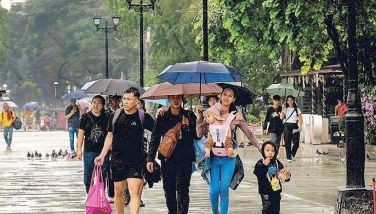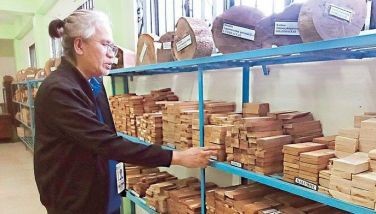Poll killings raised in talks with NDF
May 18, 2001 | 12:00am
Government negotiators are to raise the murder of candidates and campaign workers by communist guerrillas in forthcoming peace talks, a member of the panel said yesterday.
Eduardo Ermita, who serves as President Arroyo’s adviser on the peace process, said he would ask go-vernment negotiator Silvestre Bello III to bring the matter up when he meets with the communist National Democratic Front (NDF) next month.
"I told Bello to ask the NDF to tone down their violent activities short of declaring a ceasefire," Ermita said.
This developed as Philippine National Police (PNP) chief Director General Leandro Mendoza also announced that he will call the attention of the negotiating parties to atrocities committed by the NDF’s armed wing, the New People’s Army (NPA), before last Monday’s elections.
"We have documented all these atrocities and we will bring these to the attention of the GRP (government) panel," he said. "We are also looking into reports that the NPA asked for campaign fees from candidates."
NPA guerrillas have been blamed for killing 23 of the 98 people slain in election-related violence during the runup to the May 14 legislative and local elections.
The victims included Quezon Rep. Marcial Punzalan, Batangas gubernatorial candidate Cesar Platon and two mayors.
Mendoza said the PNP has yet to determine if the killing of Punzalan on May 13 was election-related. "The NPA has long harbored a grudge against him," he said. "They have long threatened to kill him."
Ermita, meanwhile, said the pre-election killings were difficult to prevent as the communists and the government had not called a ceasefire even after they had begun peace negotiations in Oslo last month.
"The problem is there is no ceasefire. There are no guidelines," Ermita said.
But he added "since we are negotiating, we want an atmosphere and environment conducive to the talks."
The communists had been making extortion demands against candidates who were campaigning in areas where they are active.
The rebels, who have an 11,500-strong guerrilla force, have been fighting for a communist state for the last 32 years.
In another development, Mendoza questioned the statistics released by the military on election-related violence, especially the part that pinned most of the blame on private armed groups.
Mendoza said the military should produce evidence in its claim that 80 percent of violence in the last elections was caused by partisan armed groups.
"If they are referring to certain groups, then who are the politicians behind these groups?" he asked.
On PNP’s records, 73 people died and 114 were wounded in a total of 106 violent incidents. The military’s tally, however, said 98 were killed in 152 bloody incidents since January.
"This may differ from other statistics or other agencies, but what I can say is that our statistics are based on evidence," Mendoza said. "We have conducted an investigation and have solved some of these incidents and arrested some of the perpetrators."
Mendoza met with military officials on Tuesday to clarify the conflicting reports. He told them that some of the deaths, like that of barangay chairman Marcelino Legacion in Carmona, Cavite in January, were not election-related.
According to Mendoza, Legacion’s death was caused by a land dispute.
The PNP chief added that contrary to widespread belief, last Monday’s polls were not the bloodiest in the country’s history.
"Compared to 1995, this has less blood. I hope there will be no more bloody incidents since most of the local canvassing of votes have been finished," he said.
Mendoza praised the 120,000-strong police force for its role in keeping the peace before, during and after the polls.
"Our men did very well despite the congruence of events from EDSA 2 on Jan. 19, to the arrest of the ex-president, to the May 1 riots and the elections," he said. – Christina Mendez
Eduardo Ermita, who serves as President Arroyo’s adviser on the peace process, said he would ask go-vernment negotiator Silvestre Bello III to bring the matter up when he meets with the communist National Democratic Front (NDF) next month.
"I told Bello to ask the NDF to tone down their violent activities short of declaring a ceasefire," Ermita said.
This developed as Philippine National Police (PNP) chief Director General Leandro Mendoza also announced that he will call the attention of the negotiating parties to atrocities committed by the NDF’s armed wing, the New People’s Army (NPA), before last Monday’s elections.
"We have documented all these atrocities and we will bring these to the attention of the GRP (government) panel," he said. "We are also looking into reports that the NPA asked for campaign fees from candidates."
NPA guerrillas have been blamed for killing 23 of the 98 people slain in election-related violence during the runup to the May 14 legislative and local elections.
The victims included Quezon Rep. Marcial Punzalan, Batangas gubernatorial candidate Cesar Platon and two mayors.
Mendoza said the PNP has yet to determine if the killing of Punzalan on May 13 was election-related. "The NPA has long harbored a grudge against him," he said. "They have long threatened to kill him."
Ermita, meanwhile, said the pre-election killings were difficult to prevent as the communists and the government had not called a ceasefire even after they had begun peace negotiations in Oslo last month.
"The problem is there is no ceasefire. There are no guidelines," Ermita said.
But he added "since we are negotiating, we want an atmosphere and environment conducive to the talks."
The communists had been making extortion demands against candidates who were campaigning in areas where they are active.
The rebels, who have an 11,500-strong guerrilla force, have been fighting for a communist state for the last 32 years.
Mendoza said the military should produce evidence in its claim that 80 percent of violence in the last elections was caused by partisan armed groups.
"If they are referring to certain groups, then who are the politicians behind these groups?" he asked.
On PNP’s records, 73 people died and 114 were wounded in a total of 106 violent incidents. The military’s tally, however, said 98 were killed in 152 bloody incidents since January.
"This may differ from other statistics or other agencies, but what I can say is that our statistics are based on evidence," Mendoza said. "We have conducted an investigation and have solved some of these incidents and arrested some of the perpetrators."
Mendoza met with military officials on Tuesday to clarify the conflicting reports. He told them that some of the deaths, like that of barangay chairman Marcelino Legacion in Carmona, Cavite in January, were not election-related.
According to Mendoza, Legacion’s death was caused by a land dispute.
The PNP chief added that contrary to widespread belief, last Monday’s polls were not the bloodiest in the country’s history.
"Compared to 1995, this has less blood. I hope there will be no more bloody incidents since most of the local canvassing of votes have been finished," he said.
Mendoza praised the 120,000-strong police force for its role in keeping the peace before, during and after the polls.
"Our men did very well despite the congruence of events from EDSA 2 on Jan. 19, to the arrest of the ex-president, to the May 1 riots and the elections," he said. – Christina Mendez
BrandSpace Articles
<
>
- Latest
- Trending
Trending
Latest
Trending
Latest
Recommended






























